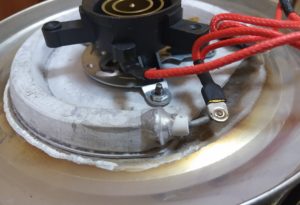
I repaired an electric kettle at a party here the other day ...
Yes, from the tool, there was only a screwdriver and a multimeter at hand. In principle, for the repair of such a simple device, it is quite enough. Well, at least for diagnostics ...
But! I had a need to get to the contact, which is located under the current collector. And for this it was necessary to unscrew 3 M3 nuts.
I repeat: I didn’t have a key or pliers with me. I already wanted to postpone the repair for the next time, when I take the right tool with me.
But then I remembered a method that I had never used, but heard about it more than once.
To do this, I needed a pen (which is not a pity and then you can throw it away) and matches (or a lighter).
The cap is not needed - it can be immediately discarded.
So, I lit the handle on the side where the rods are inserted.
After waiting about 2 seconds for the plastic to melt well, I put out the fire and ...
... put the tube on the nut, as if it were a socket wrench. I waited 20-30 seconds and started turning the tube counterclockwise.
And ... About a miracle !!! The nut is loose!
Now, in order to remove the nut from the hardened plastic, I again screwed the nut onto the stud (literally a couple of turns) and, shaking the handle from side to side, separated the nut from the handle.
Now I have an impromptu socket wrench in my hands. I unscrewed the remaining two nuts with them.
By the way, in the same way you can unscrew the self-tapping screw if you don’t have a screwdriver at hand, and you really need to unscrew it here and now :)
A self-tapping screw with a PH or PZ head cannot be unscrewed with this thing.
Yes, and a tightly twisted nut breaks plastic very easily and naturally